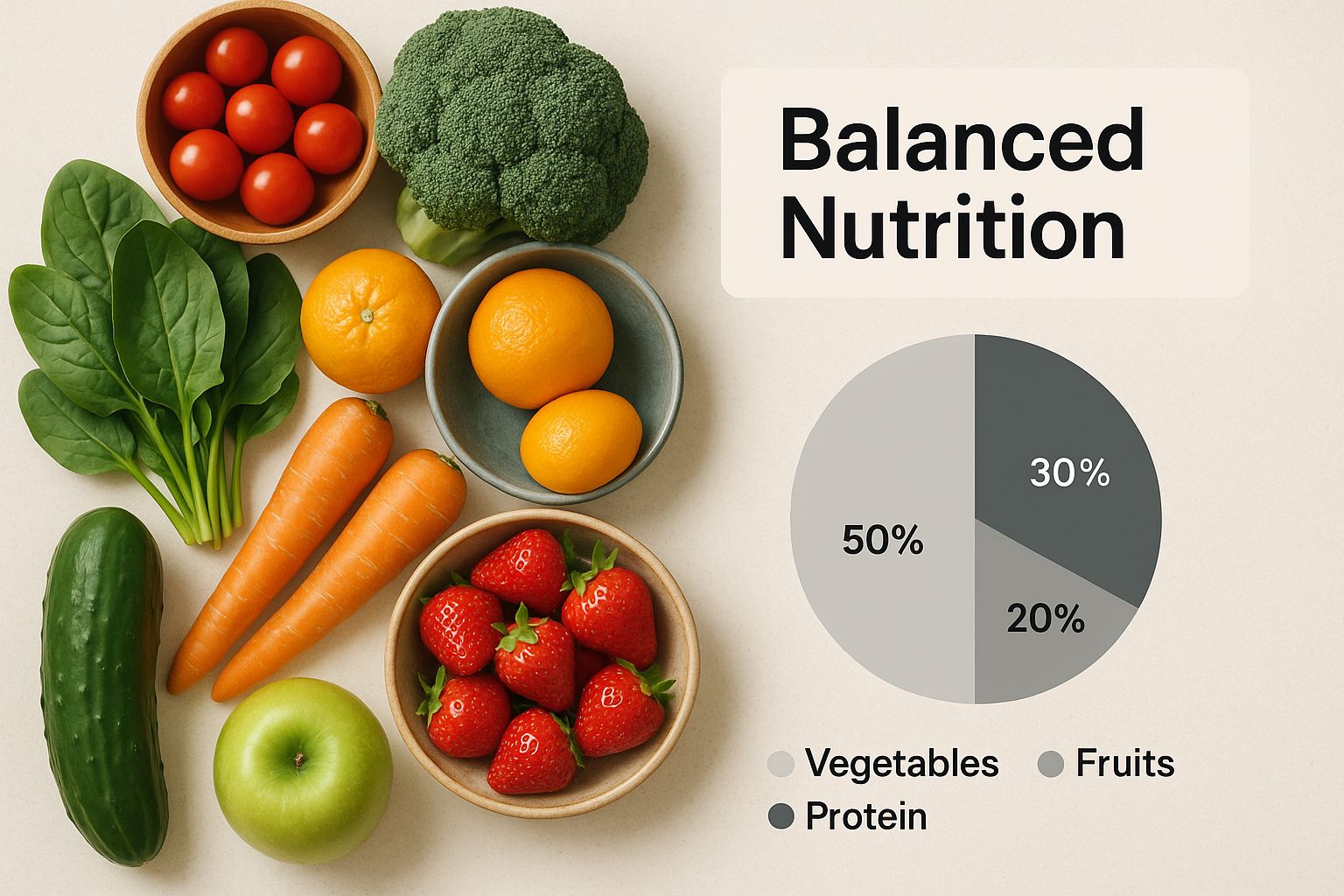Learning how to balance your hormones naturally isn't about finding a single magic bullet. It's a holistic journey that weaves together what you eat, how you manage stress, and the daily choices you make.
Think of it as building a strong foundation. It all starts with embracing whole foods, making quality sleep a non-negotiable, and integrating mindful movement into your routine. These are the cornerstones for regulating critical hormones like cortisol and insulin, setting you up for lasting hormonal harmony.
Your Guide to Natural Hormone Balance
Have you ever felt like your body is just completely out of whack? One day you're firing on all cylinders, and the next, you're wrestling with crushing fatigue, unpredictable mood swings, or cravings that came out of nowhere. More often than not, this internal rollercoaster is tied directly to your hormones.
Hormones are the powerful chemical messengers that act as your body's internal communication system. They direct nearly everything, from your metabolism and mood to your sleep patterns and reproductive health.
When this sophisticated network gets disrupted, the ripple effects can be felt everywhere. Let's look at some of the key players:
- Cortisol: Known as the "stress hormone," it governs your fight-or-flight response. When it’s constantly elevated from chronic stress, it can lead to weight gain (especially around the middle), anxiety, and that all-too-familiar feeling of burnout.
- Insulin: This is the master of your blood sugar. When it's out of balance, you're more likely to experience those dreaded energy crashes and intense cravings, which can increase your risk for metabolic problems down the line.
- Estrogen and Progesterone: These are the primary female sex hormones that conduct the orchestra of your mood, menstrual cycle, and fertility. When their delicate dance is off-kilter, it can show up as PMS, irregular periods, and emotional volatility.
Spotting the Signs of Imbalance
Tuning into your body's signals—both the subtle and the screamingly obvious—is the first real step toward getting back on track. That persistent fatigue that no amount of coffee seems to touch? Stubborn weight gain that defies your best diet and exercise efforts? Feeling emotionally fragile for no clear reason? These are all common indicators.
Your body is smart. These signals are its way of flagging that something needs your attention.
Hormonal imbalance isn't always about a major health crisis. It often shows up as a collection of smaller, nagging symptoms that chip away at your quality of life. Listening to these clues is what empowers you to take charge.
This guide is designed to give you a foundational understanding of your body’s internal landscape. We'll explore practical, actionable strategies you can start implementing today. Integrating supportive elements like holistic wellbeing tonics can also be a wonderful addition to your daily routine.
The goal here isn't a quick fix. It's about building a sustainable lifestyle that honors your body's natural rhythms and fosters vibrant, long-term health.
Using Nutrition for Hormonal Harmony
What you put on your plate sends a direct, powerful message to your hormones. I always tell my clients to think of every meal as an opportunity—a chance to either support or disrupt their body's delicate internal chemistry. This isn't about restrictive dieting; it's about building sustainable habits that nourish your endocrine system for the long haul.
The foundation is simple: prioritize whole, unprocessed foods. Picture your plate as a toolkit for hormonal regulation. Making sure each meal includes a mix of healthy fats, clean proteins, and fiber-rich carbs is the secret to maintaining stable energy and avoiding the blood sugar spikes that wreak havoc on your system.
Prioritize Blood Sugar Stability
Those constant spikes and crashes in blood sugar? They send your insulin and cortisol levels on a chaotic rollercoaster. When you grab a sugary snack or refined carbs on their own, your blood sugar skyrockets, forcing a massive insulin release to get things under control. What follows is the inevitable crash, leaving you tired, irritable, and—you guessed it—craving more sugar. It’s a vicious cycle.
This constant stress puts a heavy burden on your adrenal glands and can lead to insulin resistance down the road. The best way to break free is to build balanced meals.
- Pair Carbs with Protein and Fat: This is a non-negotiable rule I teach everyone. Never eat a "naked" carb. Instead of just an apple, have it with a handful of almonds. That protein and fat dramatically slow down sugar absorption, giving you a gentle, gradual rise and fall in blood glucose instead of a jarring spike.
- Embrace Fiber: High-fiber foods are your best friends for blood sugar control. Think vegetables, beans, lentils, and whole grains. Fiber slows everything down, keeping you full and preventing those sharp insulin jolts.
Once you grasp the importance of meal composition and timing, everything starts to click. Understanding why stable blood sugar matters for overall health is a game-changer, as it connects the dots between your diet, energy, and hormonal balance.
The image below gives you a great visual of just how vibrant and diverse a hormone-friendly plate can be.

This really drives home the point that a hormonally supportive diet is about abundance and color, not deprivation.
To help you get started, here's a breakdown of key food groups that can help you build a hormone-balancing plate.
Hormone-Balancing Food Groups and Their Functions
| Food Group | Examples | Primary Hormonal Impact |
|---|---|---|
| Healthy Fats | Avocado, olive oil, nuts, seeds, fatty fish | Provides building blocks for steroid hormones like estrogen and testosterone; helps stabilize blood sugar. |
| Cruciferous Veggies | Broccoli, cauliflower, kale, Brussels sprouts | Contains indole-3-carbinol, which supports the liver in metabolizing and clearing excess estrogen. |
| Lean Protein | Chicken, fish, lentils, organic tofu, eggs | Essential for producing peptide hormones (like insulin) and supports stable blood sugar and satiety. |
| Fiber-Rich Carbs | Berries, sweet potatoes, quinoa, oats, beans | Slows sugar absorption to prevent insulin spikes and feeds beneficial gut bacteria that influence hormones. |
| Phytoestrogens | Flax seeds, chickpeas, organic soy | Can gently modulate estrogen levels, helping to balance both high and low estrogen states. |
Making these foods a regular part of your diet provides your body with the specific nutrients it needs to create and regulate hormones effectively.
Incorporate Hormone-Supportive Superfoods
Beyond the basics, certain foods pack a serious punch when it comes to hormone support. These are the "superfoods" I recommend integrating into your diet on a regular basis.
Cruciferous vegetables—like broccoli, cauliflower, and Brussels sprouts—are at the top of my list. They contain a compound called indole-3-carbinol, which is fantastic for supporting healthy estrogen metabolism. It essentially helps your liver process and eliminate excess estrogen, which is critical for maintaining that delicate estrogen-to-progesterone ratio.
Omega-3 fatty acids are also non-negotiable. You'll find them in fatty fish like salmon and sardines, as well as in flaxseeds and walnuts. These fats are the literal building blocks for many of your hormones. Plus, their powerful anti-inflammatory properties help calm systemic inflammation that can throw your entire endocrine system out of whack.
Ultimately, using food to find hormonal harmony isn't about achieving perfection. It’s about consistently making conscious choices that give your body the raw materials it needs to function at its best. Each meal is a chance to send a positive, nourishing message to your endocrine system.
Mastering Stress to Manage Cortisol
If there's one major saboteur of hormonal health, it's chronic stress. When you're constantly on high alert, your system gets flooded with the stress hormone, cortisol. This isn't just a fleeting feeling; it fundamentally disrupts your body's natural rhythm, pulling energy away from vital functions like digestion and immunity to deal with a perceived threat.
I often tell my patients to imagine they're being chased by a lion, but not just for a moment—day in and day out. Eventually, the adrenal glands, which are responsible for pumping out cortisol, just get overworked. This can lead to what many call "adrenal fatigue," that bone-deep exhaustion and brain fog that makes even small stressors feel overwhelming. Getting a handle on cortisol is one of the most fundamental steps you can take to balance hormones naturally.

The great news is that you have more power over this process than you think. You don't need to book a week-long silent retreat to see a change. Weaving simple, intentional practices into your day can significantly lower your cortisol levels and bring back a sense of calm. Even tiny pockets of mindfulness can make a world of difference.
When cortisol levels are chronically high, the body's resources are constantly diverted. This creates a domino effect, impacting everything from blood sugar regulation to sex hormone production. Lowering cortisol is not just about feeling less stressed—it's about restoring foundational health.
Actionable Techniques to Lower Cortisol
Look, eliminating stress entirely isn't a realistic goal. The real key is building a toolkit of effective responses that can signal safety to your nervous system. By doing this, you're directly influencing your hormonal output and giving your adrenals a much-needed break. For a deeper dive, our guide on how to support adrenal glands has more great strategies.
To get started, try integrating these practical methods into your routine:
- Mindful Breathing: The moment stress hits, notice your breath. It's likely shallow and quick. Just taking five minutes for deep belly breathing can actively lower cortisol. A simple technique is to inhale slowly for four counts, hold for four, and then exhale slowly for six. This simple act flips the switch on your parasympathetic nervous system—your body's "rest and digest" mode.
- Morning Sunlight Exposure: This is one of my favorite and easiest recommendations. Get outside for 10-15 minutes shortly after you wake up. That natural light exposure helps calibrate your internal clock (circadian rhythm) and promotes a healthy cortisol curve for the day, where it's highest in the morning for energy and gradually drops by evening.
- Nature Immersion: The Japanese have a practice called "forest bathing" (shinrin-yoku), and the science behind it is solid. Research consistently shows that spending time in nature measurably reduces cortisol. You don't need a forest—even a quick walk in a local park during your lunch break can be a powerful reset.
- Gratitude Practice: It might sound a bit soft, but the effects are real. Before bed, try jotting down three specific things you're grateful for. This simple practice helps shift your brain's focus away from the day's stressors and has been shown to improve mood and reduce stress hormones over time.
By building these small habits, you create a buffer against the constant onslaught of daily stress. Each one sends a clear message to your body that you're safe, allowing it to down-regulate cortisol production and shift its focus back to repair and balance. This intentional effort is absolutely crucial for long-term hormonal well-being.
The Impact of Movement and Sleep
When it comes to your hormones, how you move and how you sleep are absolutely fundamental—not just nice-to-haves. Think of them as powerful conversations you’re having with your endocrine system every single day. Getting that interplay between activity and true recovery right is one of the most crucial parts of learning how to balance hormones naturally.
The real secret is learning to match your movement to what your body actually needs at the moment. For instance, if you’re grappling with insulin resistance or trying to get a handle on your blood sugar, strength training is a game-changer. Lifting weights or even just using your own body weight helps your muscles soak up glucose from your bloodstream far more effectively. This takes a massive load off your pancreas and gets your whole metabolic system back on track.
But what if chronic stress is the real issue? If your cortisol levels are constantly sky-high, forcing yourself through a grueling HIIT class could easily backfire. In that case, something restorative like a yin yoga class, a quiet walk in the woods, or even some gentle tai chi would be infinitely more healing. These activities flip the switch on your parasympathetic nervous system—the "rest and digest" state—telling your body it’s safe to power down the cortisol production.

The Unspoken Power of Quality Sleep
Sleep is non-negotiable. This is when your body gets down to the critical business of hormonal repair and regulation. Just one night of tossing and turning can send cortisol, insulin, and even ghrelin (your hunger hormone) into a tailspin. You know that “wired and tired” feeling? That’s often a sign that your cortisol is staying elevated into the evening when it should be at its lowest.
I often tell my patients to think of sleep as the body's nightly reset button. During those deep, restorative hours, your system is busy repairing tissues, locking in memories, and, most importantly, fine-tuning the release of nearly every hormone you have. Making it a priority isn't just a suggestion; it’s a core strategy for lasting hormonal health.
Consistently getting 7-9 hours of quality sleep is one of the single most impactful things you can do for your well-being. If that feels out of reach, start by looking at your sleep hygiene and routine.
For a deeper dive into what can help, you might find some useful ideas in our guide to the best natural sleep remedies.
Creating Your Sleep Sanctuary
Your bedroom and evening rituals send direct signals to your brain, telling it whether to wind down or stay on high alert. Here are a few simple, practical ways I advise patients to turn their bedroom into a true sanctuary for rest.
- Go Cool, Dark, and Quiet: To initiate sleep, your body's core temperature needs to drop slightly. A cool room, blackout curtains to kill any and all light pollution, and maybe a white noise machine or fan can make a world of difference.
- Set a Digital Curfew: The blue light blasting from our phones, tablets, and TVs is a notorious enemy of melatonin, your main sleep hormone. I strongly recommend powering down all screens at least 60-90 minutes before you want to be asleep. No exceptions.
- Craft a Relaxing Bedtime Ritual: Your body and brain thrive on routine. A consistent wind-down ritual cues them that sleep is on the way. This could be anything from sipping a cup of chamomile tea and reading a physical book to taking a warm bath with Epsom salts or doing five minutes of gentle stretching.
When you thoughtfully combine mindful movement with truly restorative sleep, you create a powerful synergy. This partnership supports your body’s incredible, innate ability to find its own balance.
Natural Supplements and Herbal Support
While diet and stress management are the foundation of healthy hormones, sometimes your body just needs a little extra, more targeted support. This is where high-quality supplements and traditional herbal remedies can make a real difference, gently nudging your system back into its natural rhythm.
It’s not just a niche idea anymore. People are actively seeking out these kinds of natural solutions. The global market for hormone balance supplements was valued at roughly USD 900 million in 2023 and is projected to nearly double. This trend, detailed in reports on supplements for hormone balance, shows a massive shift in how we approach wellness.
But it's crucial to be smart about it. Not all supplements are created equal, and what works for your friend might not be right for you. Think of these powerful plant allies as backup for your other efforts, not a quick fix in a bottle.
Key Adaptogens for Hormonal Resilience
Adaptogens are a fascinating class of herbs. Their claim to fame is helping the body adapt to stress, whether it's physical, chemical, or emotional. They work by fine-tuning your body's stress response system—the one that involves your adrenal glands and the infamous stress hormone, cortisol.
Two of my go-to adaptogens for hormonal support are:
- Ashwagandha (Withania somnifera): I often recommend this ancient Ayurvedic herb for calming a frazzled nervous system. It’s fantastic for helping to lower elevated cortisol levels, making it a game-changer for anyone feeling chronically stressed, anxious, or "wired but tired." By taming that constant stress response, Ashwagandha can have a wonderful downstream effect on sleep and energy.
- Maca (Lepidium meyenii): This root, originally from the Andes mountains in Peru, has a long-standing reputation for boosting energy and libido. Maca doesn't actually contain hormones; instead, it nourishes the endocrine system, particularly the pituitary and hypothalamus. This helps encourage a healthier balance between estrogen and progesterone, which is why it’s so popular for supporting reproductive health.
Choosing and Using Supplements Wisely
Walking into the supplement aisle can feel overwhelming. With endless brands and complex formulas staring back at you, how can you possibly choose something that’s both safe and effective? It's a valid question, and the quality of what you buy directly impacts the results you'll get.
Navigating the world of supplements requires a discerning eye. The smartest approach is to see them as a supportive tool, one that should always be used with guidance from a healthcare professional who truly understands your unique health profile.
To make sure you're making a good choice, always put quality and transparency first. Here are a few things I always tell my clients to look for:
- Look for Third-Party Testing: The best brands will voluntarily send their products to independent labs (like NSF or USP) to verify what’s in the bottle is pure and potent. This is your assurance that you're getting what the label says, without any unwanted contaminants.
- Start with a Single Ingredient: When you’re trying a new herb, it’s much better to start with a single-ingredient formula instead of a blend. This way, you can clearly see how your body responds to that specific plant without any other variables.
- Consult with a Professional: This is the most important step. Before you start taking anything new, have a conversation with a qualified provider, like a licensed acupuncturist or a functional medicine doctor. They can help you figure out the right herb and dosage for your specific situation and make sure it won’t interfere with other medications.
This personalized guidance is especially critical for life stages like menopause, where certain herbs can provide targeted relief from specific symptoms. You can learn more about some of these powerful botanicals in our guide to the best herbs for menopause. When you take a thoughtful and informed approach, herbal support can become a valuable ally on your journey to hormonal harmony.
Answering Your Top Questions About Balancing Hormones Naturally
Deciding to balance your hormones naturally is a huge step, and it's completely normal to have a lot of questions pop up. Let's walk through some of the most common ones I hear from clients, so you can feel clear and confident as you get started.
How Long Until I Actually Feel a Difference?
This is probably the number one question people ask, and the honest answer is: it really depends. Everyone's body is different, and where you're starting from plays a big role. But, generally speaking, if you’re consistent with the core changes—your diet, how you handle stress, and your sleep—you can start to feel subtle shifts in as little as four to six weeks. This might look like a bit more energy in the afternoon or moods that feel less like a rollercoaster.
For the more profound, lasting changes, give your body time. Think more in the range of three to six months for your system to truly recalibrate and find its new, healthier rhythm.
I'm Overwhelmed. Where Do I Start for the Biggest Impact?
If you're staring at a long list of things to change and feeling paralyzed, just breathe. You don't have to do it all at once. The two areas that will give you the most bang for your buck are blood sugar stability and stress reduction. These are the king and queen of your hormonal kingdom; when they're out of whack, everything else follows.
Here’s where to focus your energy first:
- Master the balanced plate. Make it a non-negotiable to have protein, healthy fat, and fiber at every single meal. Seriously, this one habit is a game-changer for keeping your insulin and cortisol levels steady all day long.
- Get serious about your sleep schedule. This is when your body does its most important hormonal repair work. Aim for 7-9 hours a night and try to get to bed and wake up at roughly the same time every day—yes, even on weekends.
The secret to balancing your hormones isn't about some dramatic, week-long overhaul. It’s about the small, consistent things you do every single day. Focusing on a couple of high-impact habits will get you much further than trying to change everything at once and flaming out.
It's no surprise that more people are turning to natural approaches. This shift has driven incredible growth in the wellness world. The global market for hormonal health supplements was valued at around USD 3.6 billion in 2024 and is projected to more than double. This trend shows a powerful consumer demand for plant-based solutions like adaptogens. As recent market analysis highlights, people are increasingly wary of the side effects of synthetic options and are putting more trust in nature's ability to help the body heal itself. You can find more details about this growing market on futuremarketinsights.com.
When Should I See a Professional?
While diet and lifestyle are incredibly powerful, sometimes they aren't enough to get to the root of the issue. It's time to bring in a professional if you're experiencing:
- Symptoms that are severe or just won't budge, even after you've made consistent changes.
- Sudden, unexplained shifts in your weight, hair growth or loss, or your menstrual cycle.
- Any symptoms that are really starting to interfere with your quality of life.
A qualified practitioner can run the right tests, help you connect the dots, and build a targeted plan that goes beyond the basics.
At Eric Tsai Acupuncture and Herbs, we specialize in crafting personalized treatment plans that blend the best of traditional wisdom with a modern understanding of the body. We help you restore balance from the inside out for true, long-term wellness. If you’re ready for a more guided and in-depth approach to your hormonal health, we invite you to schedule a consultation with us today.

